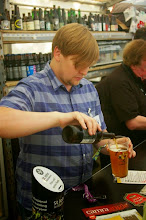I’m looking forward to trying a bottle of
my first all-grain beer batch, a coffee stout called Black Rain, which I brewed
back in January. I’ll blog about that my fully when I do, but one of the big
challenges I faced was trying to source the right coffee beans to put in the
secondary. I wanted to copy the coffee aroma of Founders’ Breakfast Stout, but
despite finding a recipe online and going to every supermarket or coffee vendor
around Cheltenham, we couldn’t find what they use – Kona coffee. (In the end,
we used some Guatemalan beans instead.)
Kona’s coffee is hugely prized – the
conditions on the volcanic western slopes of Hawaii’s Big Island are perfect
for growing it, and apparently it can fetch more than £50 a lb. (I made sure to
pick up a couple of pounds for the next batches of coffee stout – much cheaper
than that, I assure you). Somewhat less prized are the beers of their local
microbrewery, the Kona Brewing Company, which is based a few hundred yards from
the sea in Kailua-Kona. I’d seen their beers on the shelves of Whole Foods in
San Fran, but not tried any of them, so was immediately curious. Although the
beer element of our trip was ostensibly over, I can’t resist the lure of a
brewery tour, especially if there’s an adjoining brewpub.
 |
| Kona Brewing Company's compact setup, which only produces draft beer |
Given the hot and humid year-round climate
in Kona, the majority of KBC’s brews fit into the pale,
designed-to-be-served-ice-cold mould – they have a stock lager, the grassy, gassy Longboard; a
pale ale, Fire Rock; and a slightly paler ale, which was on draught only and whose name escapes me (it may be the Duke's Blonde). I wasn’t too impressed by these – bland and
anaemic, they may have been microbrewed but they didn’t taste particularly
individual. At the end of the tour, we got to try a sample of Even their
Hefeweizen, Hula, was strangely muted – lots of fruity, banana twang, but very one-note, with no real depth
or complexity.
 |
| Kona's Longboard Lager - the colour of varnished pine but without the flavour |
The Lavaman Red comes across like a pint of
English premium bitter that’s been chilled to freezing point and then
carbonated to within an inch of its life (They have a cask-conditioned night
every other Friday, and perhaps this might be better served that way). Their
IPA was better – a passion fruit bomb on the nose, although it was a bit too
dry in the finish. Our tour guide, an ebullient man called Jesse, wouldn’t
divulge the hop bill of as ‘we don’t give away our recipes’ – although this may
be news to the brewers, who put all the info for each beer on their website. So
the hops in the IPA are Northern Brewer, Cascade and Centennial – just don’t tell Jesse. The best of
the pale beers is Wailua Wheat, a wit brewed with passion fruit juice. You get
the fruit flavour straight away, but then it fades into the body of the beer to
become a refreshing note rather than dominating.
Their most successful beers are their
darker or more experimental beers. Pipeline Porter, which takes their stock
porter, Black Sand, and ages it on the aforementioned Kona coffee, was
fantastic – a really rich coffee aroma, but only a hint of coffee in the
flavour, with the caramel malt flavour dominating. Their other coffee beer, a
stout called Da Kine Grind, was even better – bumping up the strength to 8.5%
and pouring engine-black. The most impressive thing for me was the rich, creamy
head – something you don’t usually see with coffee beers due to the oil in the
coffee killing the head retention. I didn’t see it poured, so perhaps there’s
some special technique at play. We stuck to these for our time on the island –
the Pipeline Porter was so good that we took a growler of it away.
 |
| My 64oz Kona growler alongside some of their Pipeline Porter |
Pipeline was one of the beers we’d seen in
Whole Foods, and again in some of the local liquor stores on the island, so it might
have made more sense to buy bottles. However, the two beers are not necessarily
one and the same. While the beer we’d been drinking in the brewpub – and that’s
supplied to Kona’s other bars and restaurants – is brewed on site in Kona, all
their bottled beer is contract brewed by the Craft Beer Alliance at an
industrial facility in Oregon. While Jesse was quick to point out on the tour
that this was just a question of size, and that this practice is commonplace,
but it made me feel uneasy – I’ve read of UK brewers having one particularly
popular core beer contract-brewed to meet demand, usually while they are trying
to expand their own brewing facilities, but the Kona setup means that their
brewers never touch any of the beer that is distributed nationwide – only that
which is drunk in Hawaii. And there’s no indication on any of their bottle
labels that the beers, which trade heavily on their island heritage, have
actually been crafted on the mainland. Perhaps I am being too naïve here.
If you’re lucky enough to visit Kona, I do
recommend taking the tour and trying their beers for yourself. The adjoining
brewpub does fantastic food – using some of the dried, spent grain from the
mash tun to make pizza dough and bread, which I thought was quite cool. For the
moment though, I don’t think coffee is under threat as the most famous drink
from Kona.

0 comments:
Post a Comment